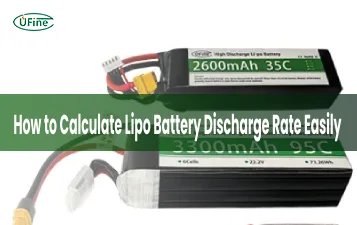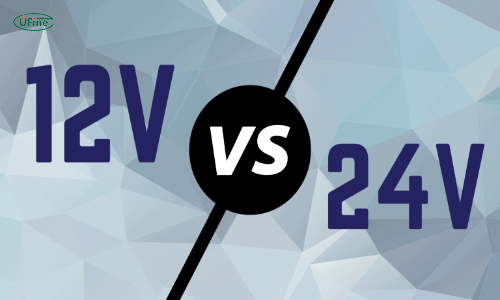Are you looking to power up your equipment or appliances efficiently? This article compares 12V and 24V battery systems, guiding you to make the best choice. Let’s explore the characteristics of both systems and what factors to consider when deciding between them.
Part 1. Why choosing the right voltage matters for batteries?
Choosing the correct voltage for batteries is essential! Here’s why:
- Efficiency: When you pick the correct voltage, your battery works better. It’s like giving it the right fuel—it runs smoothly and doesn’t waste energy.
- Compatibility: Different devices need different voltages. Choosing the right one means your devices and batteries can work together without problems.
- Safety: Using the correct voltage keeps things safe. Too much voltage can damage your devices, while too little can make them act up. The proper voltage keeps everything running safely.
- Longevity: Getting the voltage right helps your batteries and devices last longer. It’s like giving them the perfect environment to thrive in so they don’t wear out as quickly.
- Saving Money: When you choose the correct voltage, you save money in the long run. You avoid costly repairs or replacements because everything works smoothly and lasts longer.
Part 2. Understanding 12V battery systems
Voltage measures the electrical potential difference between two points in a circuit. In simpler terms, it determines how strong the electrical force pushes the electrons through a conductor like a wire or a device. In 12V battery systems, the voltage is 12 volts, which is considered a lower voltage than other systems like 24V or 48V.
Common Applications:
12V battery systems find widespread use in various applications, including automotive vehicles like cars, trucks, and motorcycles.
They are also commonly used in miniature electronics such as portable radios, flashlights, and camping gear due to their compact size and ease of use.
Benefits:
- Portability: One significant advantage of 12V battery systems is their portability. They are often lightweight and compact, making them ideal for mobile applications such as RVs, boats, and outdoor equipment.
- Compatibility: Another advantage is their compatibility with a wide range of devices and appliances that operate on 12V power. This makes them versatile and easy to integrate into various setups.
Limitations:
- Lower Power Output: One limitation of 12V systems is their relatively lower power output than higher voltage systems. While sufficient for many applications, they may need to be more suitable for efficiently powering larger or more power-hungry devices.
Part 3. Exploring 24V battery systems
24V battery systems consist of batteries connected in series to produce a total voltage output of 24 volts. This setup involves linking multiple 12V batteries together to achieve the desired voltage. You can configure these systems to meet specific power requirements and applications.
Common Applications:
24V systems are widely used in telecommunications, marine, and renewable energy industries.
Their higher voltage and power capabilities are also prevalent in electric vehicles, industrial machinery, and off-grid power systems.
Advantages:
- One of the primary advantages of 24V systems is their increased power output compared to 12V systems. This higher voltage allows more energy to be delivered to devices and equipment, improving performance.
- Additionally, 24V systems often exhibit excellent power transmission and utilization efficiency, reducing energy losses and improving overall system performance.
Limitations:
- While 24V systems offer significant advantages in terms of power, compatibility with existing equipment and appliances may be a concern. Not all devices are designed to operate on 24V power, requiring additional converters or adapters for compatibility.
- Installation and maintenance of 24V systems may also be more complex than 12V systems, requiring careful planning and expertise to ensure proper functionality and safety.
Part 4. Factors to consider when choosing between 12V and 24V
When deciding between 12V and 24V battery systems, several factors affect the system’s suitability for your specific needs.
Voltage Requirements:
- Consider the voltage requirements of the devices or equipment you intend to power. Some devices may only operate on 12V, while others require 24V for optimal performance.
Power Output:
- Evaluate the power demands of your applications. Suppose you need to power larger or more power-hungry devices. In that case, a 24V system may be more suitable due to its higher power output.
Portability:
- Assess your mobility needs. If you require a portable power solution for applications such as camping or boating, a lightweight and compact 12V system may be preferable.
Cost:
- Consider your budget constraints. 12V systems are often more cost-effective to install and maintain than 24V systems, which may require additional components and expertise.
Compatibility:
- Evaluate the compatibility of the battery system with your existing infrastructure. If you already have devices or equipment designed for 12V power, upgrading to a 24V system may require additional investments in converters or adapters.
Scalability:
- Consider your future expansion plans. A 24V system may offer greater scalability and flexibility, allowing you to quickly integrate additional components or expand your power capacity.
Part 5. FAQs
-
Can I mix 12V and 24V batteries in the same system?
Mixing batteries with different voltages is not recommended as it can lead to compatibility issues and potential damage to the devices or equipment connected to the system. -
What happens if I use the wrong voltage for my device?
Using the wrong voltage can cause damage to your device, ranging from minor malfunctions to complete failure. It’s crucial to match the voltage requirements of your devices with the battery system you’re using. -
Do all devices require either 12V or 24V power?
No, not all devices are designed to operate on either 12V or 24V power. Some devices may require different voltages, so it’s essential to check the specifications of each device before connecting it to a battery system. -
How do I know which voltage system is best for my application?
Determining the best voltage system depends on factors such as the power requirements of your devices, portability needs, and budget considerations. Assessing these factors can help you make an informed decision. -
Can I convert between 12V and 24V systems if needed?
Yes, converting between 12V and 24V systems is possible using voltage converters or adapters. However, it’s essential to ensure compatibility and proper installation to avoid device issues or damage.
Related Tags:
More Articles

LiPo Battery Discharge Rate Guide & Calculation Tips
Understand LiPo battery discharge rates, C-ratings, and how to calculate max current. Essential guide for RC, drones, and electronics users.
High‑Capacity 3S LiPo Batteries: 5000 mAh vs. 10000 mAh
Compare 3S LiPo 5000mAh vs 10000mAh batteries by weight, power, and use. Find the best fit for your drone, RC car, or boat setup.
Top 5 Applications for Small 3S LiPo Batteries
Small 3S LiPo batteries power drones, RC gear, wearables, and robotics with high energy and low weight. Making them ideal for compact electronics projects.
Building and Charging Your Own 3S LiPo Pack: A Step‑by‑Step Guide
Learn how to build, balance, and charge a 3S LiPo battery pack safely at home with this complete DIY guide for hobbyists and beginners.
How to Choose the Right LiPo Battery Plug Type?
Discover the best LiPo battery plug types, how to choose them, and expert tips for safe usage, soldering, and maintenance.




